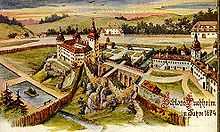Attnang-Puchheim
| Attnang-Puchheim | ||
|---|---|---|
|
Puchheim palace | ||
| ||
 Attnang-Puchheim Location within Austria | ||
| Coordinates: 48°01′00″N 13°43′11″E / 48.01667°N 13.71972°ECoordinates: 48°01′00″N 13°43′11″E / 48.01667°N 13.71972°E | ||
| Country | Austria | |
| State | Upper Austria | |
| District | Vöcklabruck | |
| Government | ||
| • Mayor | Peter Groiß (SPÖ) | |
| Area | ||
| • Total | 12.32 km2 (4.76 sq mi) | |
| Elevation | 416 m (1,365 ft) | |
| Population (1 January 2014)[1] | ||
| • Total | 8,806 | |
| • Density | 710/km2 (1,900/sq mi) | |
| Time zone | CET (UTC+1) | |
| • Summer (DST) | CEST (UTC+2) | |
| Postal code | 4800 | |
| Area code | 07674 | |
| Vehicle registration | VB | |
| Website | www.attnang-puchheim.at | |
Attnang-Puchheim is a town in Austria, located in the Vöcklabruck district, lying between the cities Vöcklabruck and Schwanenstadt. It is twinned with the city of Puchheim in Bavaria.
Geography
Attnang-Puchheim is centered in the Hausruckviertel, a county within Upper Austria in the northern Austrian Prealps. Attnang-Puchheim is also called as "Door to Salzkammergut".
History
Attnang was founded by Bavarian seddlers in the late 8th century. The town of Puchheim is documented the first time in 1135, Attnang about one hundred years later in 1242. In 1912 the community changed its name from Puchheim to Attnang-Puchheim to acknowledge this growing part of the town.
In World War II, the trainstation served as connection to the Schlier V-2 rocket motor test area. The Attnang-Puchheim marshalling yard was bombed on April 21, 1945 at 10:57 by 179 bombers of the US 15th Air Force from Foggia, Italy.
|
Attnang-Pucheim bombing damage List identifying Attnang-Puchheim subcamp |
The air raid destroyed/damaged 120 apartments and 277 houses and caused the highest World War II death rate in Austria: 708 of 5,600 residents or 12.9% (compared to 2.5% for Wiener Neustadt). The Allies captured Attnang-Puttheim on May 5, 1945.[2][3]
Population
| Historical population | ||
|---|---|---|
| Year | Pop. | ±% |
| 1869 | 1,046 | — |
| 1880 | 1,251 | +19.6% |
| 1890 | 1,546 | +23.6% |
| 1900 | 2,333 | +50.9% |
| 1910 | 3,787 | +62.3% |
| 1923 | 4,608 | +21.7% |
| 1934 | 5,222 | +13.3% |
| 1939 | 5,413 | +3.7% |
| 1951 | 6,828 | +26.1% |
| 1961 | 7,525 | +10.2% |
| 1971 | 7,940 | +5.5% |
| 1981 | 8,044 | +1.3% |
| 1991 | 8,139 | +1.2% |
| 2001 | 8,757 | +7.6% |
| 2011 | 8,908 | +1.7% |
Transportation
Attnang-Puchheim railway station is a railway junction, where the Salzkammergut line connects with the Salzburg - Vienna line. It is an important station for travellers who wish to access the Salzkammergut from the rest of Austria and Europe, serving both rail and bus passengers. It has some importance for freight traffic and locomotive servicing, though not as much as in former days, when it was a major division point.
 Historic view of the Stronghold Puchheim in the year 1674 |
Politics
The current mayor (Bürgermeister) is Peter Groiß of the SPÖ (Social Democratic Party of Austria).
Industry
The largest enterprises are STIWA and Spitz, giving work to more than 1.500 people in the area.
Personalities
The following were born in Attnang:
- Friedrich Peter (1921–2005), Head of the Austrian Freedom Party from 1958 to 1978 FPÖ
- Maria Fekter (* 1. February 1956), Minister of Interior Affairs ÖVP
Sports
Attnang-Puchheim is home to the Attnang Athletic's baseball team. Their ballpark A's Garden further serves as trainingcenter for the Austrian Baseball Association.
References and notes
- ↑ Statistik Austria - Bevölkerung zu Jahres- und Quartalsanfang, 2014-01-01.
- ↑ "48-01 N 13-43 E" (html in German). Retrieved 2008-07-28.
- ↑ Boehm, Helmut F (1988). Der Tag der Tränen. Attnang-Puchheim im Bombenhagel (in German). ISBN 978-3-85339-199-0. Retrieved 2008-07-28.
| Wikimedia Commons has media related to Attnang-Puchheim. |

